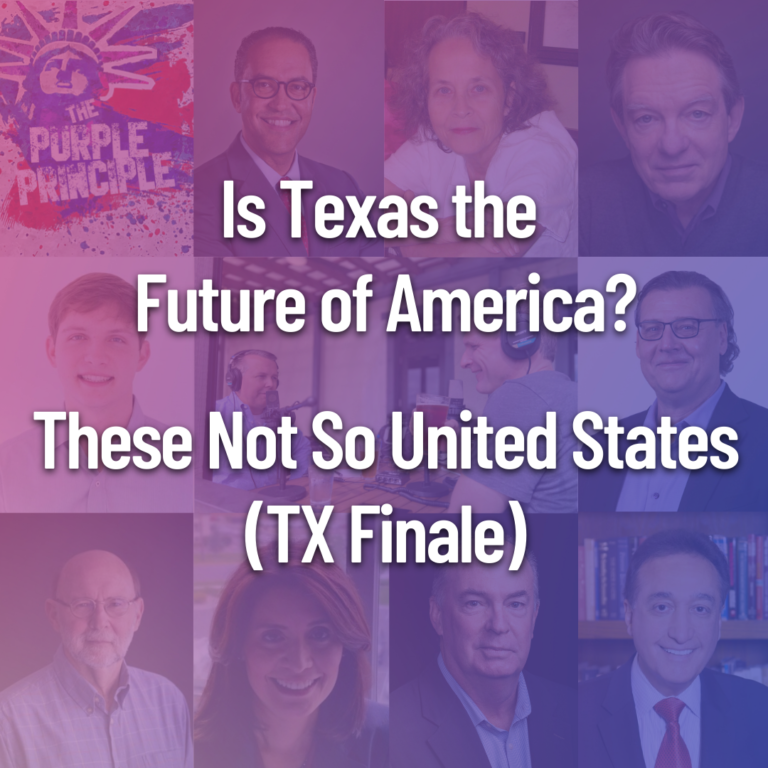No Quick, Simple Fixes for Polarization
From the Editors | Inertia and Polarization | Issue 6 | June 25, 2021
Life is riddled with challenges easier to wander into than work out of. As many bathroom scales attest, it’s far easier to gain than lose weight. It’s also easier to rupture than repair relationships; get into debt than out; and damage ecosystems, or social fabrics, than to reverse that damage. What may begin as isolated events soon become habitual; and what once were separate factors gradually interlock and reinforce. In other words, there’s lots of social inertia at work out there and not a small amount within us.
For the country writ large, this means it’s dangerously easier to ride the forces of polarization for decades to a very partisan place than to turn and work against that tide. This edition of the Purple Principle in Print highlights the problem of inertia at the psychological and social levels. Two upcoming guests speak persuasively, though not pessimistically, to this point.
In terms of direct human interaction, Peter Coleman warns in the upcoming Purple Principle episode, Embrace Complexity To Overcome Polarization, that “when you believe without a doubt that they are all idiots, misinformed and trying to harm our country. And you believe without a doubt that we are all victimized by their insanity, that’s a problem, right? And that’s very often our view of the other side.”
Fortunately, in his recent book (The Way Out: How to Overcome Toxic Polarization), Coleman outlines principles by which intractable conflicts at individual and social levels can be reversed. A critical first step in avoiding simplistic, born-to-fail solutions is a full embrace of the complexity of longstanding, multivariable problems like polarization. Other necessary, if not sufficient, conditions for progress are broad dissatisfaction with the status quo and a precipitating crisis, such as a pandemic.
But Coleman is quick to note that hyperpartisanship and polarization in the U.S won out over reconciliation during COVID, at least in the short term. And a recent Brown University study highlighted here documents that political identity was indeed a major driver in COVID related response.
Another TPP guest, Chris Bail, Director of the Duke University Polarization Lab, conducts research on a similar, if more digital, wavelength. A recent Wired article linked below surveys the many well-intentioned efforts to diversify news and opinion offerings of readers concerned about echo chambers. But Dr. Bail advises that simply inserting blue perspective into red feeds, and red into blue, will not reverse polarization, and may exacerbate it. According to his research, that’s because core identities are at stake.
In Breaking the Social Media Prism, as in his Purple Principle interview, Bail concludes that the vast majority of people are not logging onto Facebook, Twitter, and other platforms to seek wisdom, information or entertainment, but rather to test and assert identities. As a result, reducing polarization will need more sophisticated tools than newsfeed variation. Dr. Bail and his colleagues at the Polarization Lab, and other labs, have begun to develop, deploy, and test such tools. But it’s difficult to expect a major, sustainable alternative platform built on less tribal and more enlightened principles anytime soon. In that sense, we’re clearly in the early stages of the long-term struggle against polarization, which, as a force, remains enticing, complicated, and inert, though not irreversible given sufficient time, insight and concerted effort.
Highlights & Insights from The Purple Principle

“I started to be approached by some journalistic organizations that were … matching people from different sides of an issue and asking them to go off and have a cup of coffee or a drink and a conversation… there are certain conditions under which intergroup contact helps. And there are many conditions that don’t. And unfortunately, some of the organizations that are encouraging people to get together, particularly without facilitation, for short periods of time to focus immediately on their differences, these things backfire.”
— Dr. Peter Coleman
“We actually recruited more than a thousand Republicans and Democrats… and we paid them to follow bots that we created in the lab that retweeted messages from people from the other side. And the idea was, of course, that if you take people out of their echo chamber, they should become more moderate. And unfortunately, what we found is more or less the opposite. Nobody became more moderate when they followed these bots for a month that exposed them to the other side. And some people, particularly Republicans, became much more polarized. They doubled down on their preexisting views.”
— Dr. Chris Bail
What We’re Reading


Partisanship guided Americans’ personal safety decisions early in the pandemic, study finds
First, party over country; now party over life. An ominous finding for future public health efforts.
Can corrections spread misinformation to new audiences? Testing for the elusive familiarity backfire effect
Cognitive Research: Principles & Applications
Fact checking is no panacea for misinformation, especially when misinfo gets repeated in the process.
Interview with the sociologist who coined the term “culture war” in the early 2000s. A nuanced look at the complex, shifting dynamics of that phenomenon
The term “culture war” continues to ring relevant two decades on.
How Some Americans Are Breaking Out of Political Echo Chambers
Here’s a survey of well intentioned efforts at media diet diversity. But author and TPP guest Dr. Chris Bail cautions that identity may complicate matters.
A short, easy summary of how some cognitive biases can make us more polarized. These are intrinsic to all humans, but very hard to recognize and correct in ourselves
To err is human. And failure to recognize and admit to erring? Also all too human.
Conflict Intelligence and Systemic Wisdom: Meta-Competencies for Engaging Conflict in a Complex, Dynamic World
In this 2018 study by TPP guest Dr. Peter Coleman, insights from research in complexity science, psychology, and peace and conflict studies are used to develop a new framework for addressing these challenges and help individuals resolve conflict and promote more constructive and peaceful relations in our rapidly changing world.
This week is the Purple Principle’s one-year anniversary!

Co-Author, The Politics Industry
Featured in “The Politics Industry at Work”
“I know, I’ll do policy. I’ll get involved with these policy organizations. Oh, shoot. Everybody knows the good policy. They just don’t have the political will to do it. I know, I’ll do culture and get everybody to be friends and want to work together in a bipartisan way. Oh, shoot. That doesn’t work. They say they want to work together in a bipartisan way. And then they always vote the same way.”

Featured in “Online Conspiracies & Virtual Cults, Part 2”
“So let’s say if you were in some small town in Nebraska in the 1970s, and you said, “I think the earth is flat.” Chances are everyone around you is going to be like, “it’s not.” Now if you come up with an idea or if you see something and you think, Oh, that sounds like that could be true. The first thing you do when you search on the internet, just basic human psychology, you’re probably not looking for proof that it’s wrong. You’re probably looking for things to prove that it’s right.”

Author of The Fear Factor
Featured in “Heard from the Herd”
“And so, unfortunately the way that we get information in the world right now…makes us very susceptible to messaging from big organizations that don’t care at all how well people get along. All they care about is their own interest. And so I firmly believe there… is a corporate slash financial component to why people falsely believe that there is such disagreement on these issues.”

Featured in “The Brain on Partisanship”
“And there’s been a couple of studies where they have looked at what happens when certain cults predict the end of the world, and what happens the day that the prediction doesn’t come true. What you might expect is that cult members should update their beliefs… But that’s not what happens. In fact, if anything, the opposite happens. They immediately start to look for rationalizations… They actually double down on this identity. And so there’s a kernel of that psychology in human nature that applies to all kinds of identities we have. “

Senior Fellow, University College London
Author of Rage Inside the Machine
Featured in “Social Media & Partisanship”
“Facebook really does broadcast hate speech. There’s no doubt about it. They do. I don’t think any of the major media providers are actually deeply evil. I don’t think that’s true. I do think that the goals that we’ve programmed them with, through programming and AI, these corporations may not be compatible with having an effective society.”
Partner in Purple
FairVote is a nonpartisan organization advancing voting reforms that make democracy more functional and representative – such as ranked choice voting (RCV). At the municipal level, roughly two dozen cities in Utah will be utilizing RCV this year, while New York City is currently holding their first mayoral election using RCV. At the state level, Alaska passed an ambitious 2020 ballot measure, making it the second state, along with Maine, to use RCV for federal elections.









